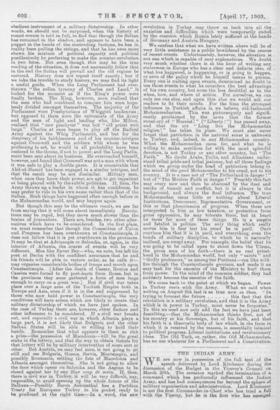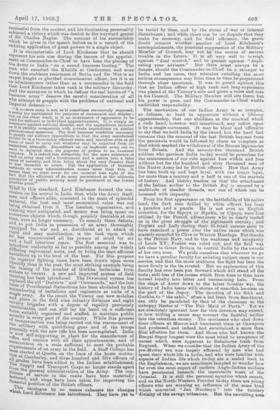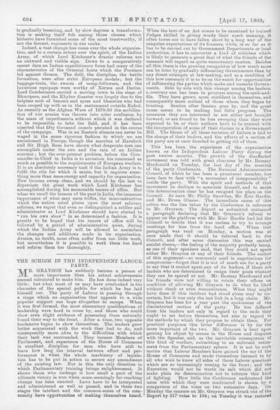THE INDIAN ARMY.
WE are now in possession of the full text of the speech delivered by Lord Kitchener during the discussion, of the Budget in the Viceroy's Connell on March 29th. The occasion marked the termination of a command which has profoundly influenced the Indian Army, and has had consequences far beyond the sphere of military organisation and administration. Lord Kitchener is not the first Commander-in-Chief who has tried a fell with the Viceroy, but he is the first who has emerged successful from the contest, and his dominating personality achieved a victory which was denied to the wayward genius Of Sir Charles Napier. The account of his stewardship Which lie gives in the speech before us is a record of the untiring application. of great powers to a single object. It is characteristic of Lord Kitchener that he should represent his sole aim during the tenure of his appoint- ment as Commander-in-Chief to have been the placing of the Army in India "on a sound business footing." The man who smashed the Khalifa at Omdurman and wore clown the stubborn resistance of Botha and De Wet is no carpet knight or glorified commissariat officer, but it is as an administrator rather than as a commander in the field that Lord Kitchener takes rank in the military hierarchy. And the sentences in which he defines the real nature of " business army" deserve the careful consideration of all 'who attempt to grapple with the problems of national and Imperial defence :— "A. modern army is not, as is sometimes erroneously supposed, a costly toy maintained for purposes of ceremonial and display ; nor, on the other hand, is it an instrument of aggression to be Used for national or individual aggrandisement. It is simply an insurance against national disaster, and the expenditure incurred on it is strictly comparable with private expenditure on similar Precautionary measures. The first business condition necessary to justify our military expenditure is that the army maintained should be in a thoroughly efficient state, and therefore able at all times of need to carry Out whatever may be expected from its umnerical strength. Expenditure on an inefficient army can no more be defended than the payment of prernia to an insolvent company. It is indeed less defensible, for the mere existence of such an army may lull a Government and a nation into a false !cue of security, and thus bring about the very disaster that It was intended to avert. But the application of business Methods to army administration means more than this. It uleans that we must never for one moment lose sight of the fact that the efficiency of an army maintained as the ultimate guarantee of public security must be purchased at the lowest possible price.'
Tried by this standard, Lord Kitchener formed the con- clusion on his arrival in India that, while the Army itself, men and officers alike, consisted in the main of splendid ina.terial, the best and most economical value was not being obtained from it. The location, organisation, and training were antiquated, and money was being spent on numerous objects which, though possibly desirable at one tune, were no longer necessary. To remedy these defects, and to put India in possession of an army thoroughly ecluiPped for war and so distributed as to admitof f,apid, and easy mobilisation, is the task upon which l -6 ute concentrated all his powers of mind for six 1,ind a half laborious years. The first essential was to 1,u.troduce uniformity as far as possible among the widely ?liTering regimental units, and to bring the least efficient battalions up to the level of the best. For this purpose ,9e superior fighting races have been drawn upon more liberally than in the past, the most striking example being tl;10 raising of the number of Gurkha battalions from aixteen to twenty. A new and improved system of field t :raining has been introduced. The Divisional system has lePlaced the old "Districts" and "Commands," and the last ;race of Presidential distinctions has been abolished by the e.aunihering of battalions and regiments as units of a °Ingle army. As the result the Viceroy can now mobilise and. Place in the field nine infantry divisions and eight Cavalry brigades with a degree of rapidity previously il ,,nattainable, and can still lay his hand on a sufficient suitably organised and staffed, to maintain public Ele_eurity in every part of the country. While this process ,°,1 reorganisation was being carried out the rearmament of the artillery with quickfiring guns and of the troops reue,,,n , with the new rifle has been accomplished. India 11" self-supporting in plant for the manufacture of ea and cannon with all their appurtenances, and of q:.reinunition on a scale sufficient to meet the probable !equirenients of an army in the field. A Staff College has nifta started at Quetta on the lines of the home institu- tion at Camberley, and three hundred and fifty officers of a,„1,I grades have been added to the Indian establishment. ,-u_he Supply and Transport Corps no longer stands apart Lcir.otin the general administration of the Army. The con- fi t ble.,1°118tered, and of service in the ranks have been materially steps have been taken for improving the aauelal position of the British officers, catalogue by no means exhausts the changes wulell Lord Eitolisnor barn introduced. They have yet to be tested by time, and by the stress of war or internal disturbance ; and while there can be no dispute that they make for economy, and for field efficiency, the grave doubt remains whether another of Lord Kitchener's accomplishments, the practical suppression of the Military Member of Council, may not be the source of serious trouble in the future. It is all very well to inveigh against "dual control," and to protest against "dupli- cating your advisers." But there must always be a danger, should the Commander-in-Chief be a stranger to India and her races, that mistakes entailing the most serious consequences may from time to time be perpetrated through sheer ignorance it was to guard against this that an Indian officer of high rank and long experience was placed at the Viceroy's side and given a voice and vote in his Council. The Military Member still sits there, but his power is gone, and the Commander-in-Chief wields undivided responsibility.
The mechanism of our Indian Army is so complex, so delicate, so hard to appreciate without a lifelong apprenticeship, that one shudders at the mischief which a rude hand, however well intentioned, may inflict upon it by a single movement. It may be blunt and offensive to say that we hold India by the sword, but the hard fact remains that the removal of the last British bayonet from the peninsula would be followed by chaos as complete as that which marked the withdrawal of the Roman legionaries from Britain. And the seventy-five thousand British soldiers who garrison India to-day would be powerless for the maintenance of our rule against foes within and foes without but for the hundred and sixty thousand men of the Native Army led by British officers. How that Army has been built up and kept loyal, with one tragic lapse, for more than a century and a half is one of the marvels of history. And history teaches us that the attachment of the Indian soldier to the British Raj is secured by a multitude of slender threads, not one of which can be loosened with impunity.
From his first appearance on the battlefields of his native land, the dark man drilled by white officers has been a paradox and a puzzle. He is not even an English invention, for the Sepoys, or Sipahis, or Cipays, were first utilised by the French adventurers who so nearly ousted us in the great struggle of the eighteenth century ; and Dupleix and Lally during their ill-fated careers seem to have exercised a power over the native races which was scarcely exceeded by Clive or Warren Hastings. But thanks to the British Navy, and to the weakness and incapacity of Louis XV., France was ruled out, and the field was left clear to Great Britain to control India by the swords of her own sons. We pride ourselves that wherever we go we have a peculiar faculty for enlisting subject races in our service, and that the more stubborn the fight has been the more firmly is the tie riveted. But no explanation of this faculty has ever been put forward which will stand all the tests ; still less of the causes which from time to time have turned loyalty into bitter and unreasoning hate. From the siege of Arcot down to the latest frontier war, the history of India teems with stories of unselfish heroism on the part of the Sepoy. The devotion of the Sikh and Gurkha to " the sahib," often a lad fresh from Sandhurst, can only be paralleled by that of the clansmen to the unhappy Hector of "The Fair Maid of Perth." Yet we are absolutely ignorant how far this devotion may extend, or how trifling a cause may convert the faithful soldier into the relentless enemy. The mutineers who shot down their officers at Meerut and butchered them at Cawnpore had professed, and indeed had entertained, a more than filial affection for them. And those who had known the Bengal Sepoy longest were the most blind to symptoms of unrest which were apparent to Subalterns fresh from England. When we consider that the Indian Army of the pre-Mutiny era was largely officered by men who had spent their whole life in India, and who were familiar with aspects of Indian life which to-day are a sealed book to the Englishman, we are sometimes tempted to wonder how far even the most expert of modern Anglo-Indian soldiers have penetrated beneath the inscrutable mask of the Oriental. It is still the personal equation which counts, and on the North-Western Frontier to-day there are young officers who are winning an Influence of the same kind which converted "Jan Nicolsoyn " into the tutelary divinity of the savage tribesman. 1.1ut the recruiting area is gradually lessening, and by slow degrees a transforma- tion is making 'itself felt among those classes which hitherto have furnished some of the most trustworthy, if not the fiercest, regiments in our ranks.
Indeed, a vast change has come over the whole organisa- tion, and to a certain extent over the spirit, of the Indian Army, of which Lord Kitchener's drastic reforms are an outward and visible sign. Down to a comparatively recent date an Indian expeditionary force had many of the characteristics of the Oriental hosts which the Persians led against Greece. The drill, the discipline, the battle formation, were after strict European models; but the baggage-train, the swarm of camp-followers, and the luxurious equipage were worthy of Xerxes and Darius. Lord Combermere carried a moving town to the siege of Bhurtpore, and the Khyber disaster was largely due to the helpless mob of bearers and syces and bheesties who had been cooped up with us in the cantonment outside Kabul. As recently as the Afghan Wars of 1878-80 the mobilisa- tion of our armies was thrown into utter confusion by the mass of impedimenta without which it was declared to be impossible to take the field, and it has been asserted that fifty thousand camels perished in the course of the campaign. War in an Eastern climate can never be waged in the same rigorous fashion to which we are accustomed in Europe, though the marches of Havelock and Sir Hugh Rose have shown what desperate men can accomplish under the sun and the rain of an Indian summer ; but the ever-present problem before the Coin- mander-in-Chief in India is to accustom his command as much as possible to the requirements of European warfare. It is an absolutely necessary task if the Indian Army is to fulfil the role for which it exists, but it requires some- thing more than mere energy and capacity for organisation. New brooms sweep clean, and we should be the last to depreciate the great work which Lord Kitchener has accomplished during his memorable tenure of office. But when we recall the lessons of the past in India, the immense importance of what may seem trifles, the misconstruction which the native mind places upon the most salutary reforms, we regret that even so distinguished a soldier and administrator as Lord Kitchener should have elected to "run his own show" in so determined a fashion. It is greatly to be hoped that his tenure of office will be followed by a period of administrative quiet, during which the Indian Army will be allowed to assimilate the changes and additions made in its organisation. Armies, no doubt, most often suffer from too little work, but nevertheless it is possible to work them too hard and reform them too thoroughly.








































 Previous page
Previous page